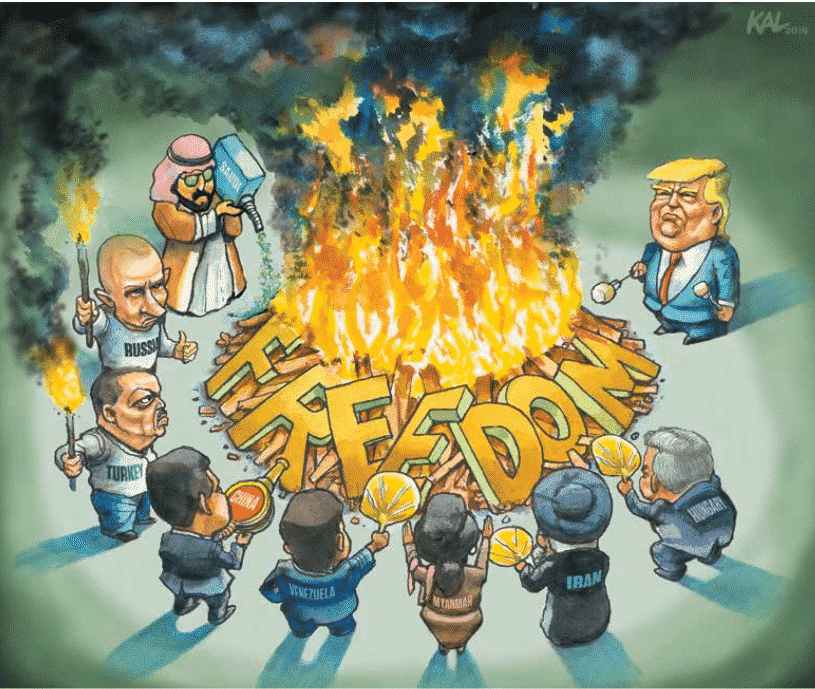According to Freedom House’s Freedom in the World Report 2019, released last week, 2018 was the 13th year in a row showing an overall decline in global freedom and democracy. Despite this, Angola, who is classified as ‘Not Free’, increased by 5 points from 2017, making them the country with the 4th largest one-year gains in 2018.
Freedom in the World (FIW) is an annual global report on political rights and civil liberties covering 195 countries and 14 territories and comprises of numerical ratings and descriptive texts for each. The report is regarded as one of the leading global metrics for measuring democracy and freedom across the globe and is one of the most widely read rankings on human rights.
Freedom house uses in-house and external analysts and expert advisors to review each country on a yearly basis to prepare reports and assign scores. The analysis is based on news articles, academic analyses, NGO reports, individual professional contacts, and on-the-ground research. FIW assesses the real-world rights and freedoms that individuals enjoy, rather than analysing governments or government performance, therefore focussing on the implementation of rights in practice in each country.
The report ranks countries and territories as either Free, Partly Free or Not Free. There are 10 political rights indicators and 15 civil liberties indicators covering categories such as electoral process, functioning of government, freedom of expression and belief to rule of law and personal autonomy and individual rights. Each indicator receives a score from 0-4 whereby 0 equals the least amount of freedom and 4 equals the most amount freedom. Each country is then assigned a rating for political rights and one for civil liberties between 1 and 7 (1 represents most free, 7 represents least free) which are then averaged in order to calculate the country’s overall Freedom Rating determining the country’s status as either Free (1.0-2.5), Partly Free (3.0-5.0), or Not Free (5.5-7.0).
The 2019 FIW report highlights a downward trend in freedom and democracy globally since 2005. The surge of progress that was witnessed in the wake of the end of the cold war - whereby between 1988 and 2005 the percentage of countries ranked as not free decreased from 37 to 23 percent and the number of free countries grew from 36 to 46 percent – has begun to decline. Since 2005, the percentage of not free countries has risen to 26% and free countries declined to 44%. In 2018, every region, apart from the Asia-Pacific, received a lower average score than they did in 2005.
Despite this downward trend, more countries in 2018 made net improvements compared with 2017 and there were overall a smaller number of net declines. Ethiopia, Malaysia, Armenia, Angola, The Gambia, and Ecuador were the top six countries with score gains in 2018, and all have in common the emergence of a new leader/change in government and the introduction of reforms in response to demands for change from the public.
The Corruption Perceptions Index (CPI) is another global measurement tool, focussing on perceived levels of corruption in the public sector. Published by Transparency International, the CPI measures the perceived levels of public sector corruption in 180 countries or territories using surveys of business people and expert assessments. Each country/territory then receives a score between 0 and 100, where 0 is highly corrupt and 100 is very clean.
Similar to the results from FIW 2019, the 2018 CPI also found that the vast majority of countries are not making progress in the fight against corruption, highlighting that only 20 countries have made significant progress in recent years. The CPI, which was released one-week prior to the FIW report, notes the important link between corruption and democracy, which was further reinforced by the release of the FIW and its 2018 rankings. Both indices show that increased corruption/lack of controls on corruption have a negative effect on democracy. The CPI and FIW results highlight a vicious cycle whereby corruption undermines democratic institutions which in turn results in weak institutions unable to keep a check on corruption.
To read the full reports, please go to:
FIW 2019
CPI 2018
More information on the methodologies used can be found at:
Freedom in the World Report
Corruption Perceptions Index
Author: Hannah Hills
Freedom in the World 2019
